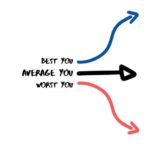I don’t like pain. Both physical and mental. It sucks to sprain an ankle, to lose a game, to go through a breakup, or to experience the death of someone close to you. And as much as we want to avoid these forms of pain, they are inevitable.
Real suffering cuts through all the crap. It ends all BS and reminds you of what matters most. You don’t appreciate a healthy body until your sick, you don’t soak in every win when you’re undefeated, and we too often forget to cherish the people we love while they are still breathing. In the same way that everything good can possibly happen, so can all the bad. The potential for both will continue to exist.

Now, I know what you are thinking, “Derek sure is getting very dark these days with his articles”. However, I promise you this one is heading in a positive direction. Just bear with me. There is a very important reason that I bring all of this up and it’s going to make you really think about what you value most.
Everything will suck at some point
All our lives we are taught to think positively. To act as if everything is going to work out and hope for the best. But if you’ve spent more than 10 seconds on this planet, you probably learned that things don’t always work out in our favour. Not everything goes according to plan. And if you’ve experienced enough pain in this life and been able to bounce back from it, then you probably also understand something very important: We appreciate things more when we realize that we can lose them.
Here’s the thing – as much as I’d like to live forever, I don’t think that would be very enjoyable or fulfilling for that matter. Life wouldn’t have any real meaning because it would never not exist. It would just always be there, like that Magic Bullet infomercial playing every night at 2 am.
I think the same mindset also applies to the life of an athlete. If you could play your sport from the time you were 5 until you were an old grandma, I doubt you would truly love the experience the whole way through. It’s the finite life of an athlete that creates a deep bond and a sense of urgency to truly push yourself while you still have time.
And unfortunately, I think a lot of athletes still struggle to carry this appreciation with them every single day. They act as if they’ve got all the time in the world and next season will finally be their moment.

Well, as someone who has retired from their sport, I can tell you two very hard truths. (1) You will miss playing more than you can imagine and (2) your time to shine in the spotlight will not exist if you don’t focus on today.
So, the real question we need to consider is this:
How can we remind ourselves to be focused on today and remember that our athletic career (and our lives) are limited?
The answer: Through practicing something called Negative Visualization.
Harnessing Our Negative Thinking
As human beings, it can be difficult to not think negatively. In many ways, we are hardwired to avoid pain. It’s why fear is such a strong emotion – it keeps us from repeating a past mistake that caused us, or someone else, to experience pain.
Now sometimes this line of thinking can be helpful. It’s there to make sure that we look both ways before crossing the street or open the shower door carefully so we don’t smash it and then owe our Airbnb host $200 to fix it (it wasn’t my fault I swear). These can be helpful to remember because the consequences of repeating them would be both devastating and incredibly stupid.
Our minds also tend to wander towards the irrational. Towards the things that on an average day probably won’t happen, but if the stars align, it could just work out (in a bad way). However, the point I’ve been working towards here and why I started out with reminding you of how fleeting our lives truly are, is because I believe there is power in harnessing this type of negative thinking. And I’m not alone in this thought process.
Whether it’s business leaders who practice something called a Premortem or the ancient Stoic philosophers who encourage people to regularly employ negative visualization. Preparing for the worst-case scenario can actually cause us to be more focused, grounded, and appreciative of the little that we currently possess.

How to practice negative visualization
The idea here is simple. We shouldn’t wait for a catastrophic moment or big loss to arrive before you decide to appreciate each moment. Instead, we should practice negative visualization and live to make the most of today.
So, what does that look like in action? Simply put, we should be spending brief moments reflecting and imagining what it would feel like to lose something we value. That way, when we spend time doing or being with this thing we value, we are that much more inclined to love and enjoy it while it’s still around.
Here’s a little example to explain why this matters: Let’s say there are two athletes. One athlete wakes up each morning and tells himself that this could be the last day I ever play my sport. I could suffer a career-ending injury, I could be forced to retire early due to an unforeseen life event, or I could even die today.
On the other hand, you have an athlete who wakes up, heads out to their training and carries on like nothing will ever change.
If both of these athletes were to suffer from an unexpected injury like a torn ACL, a life-threatening illness, or crippling car accident, who do you think is more likely to look back on their career with fewer regrets? Who will be plagued with less “if only” thoughts? Or for that matter, who is more likely to bounce back and make an epic recovery?

I think the answer to all of those questions is rather clear. On top of all that, the person who is regularly practicing negative visualization gets the added benefit of truly loving each day for the beauty of what it presents. Whether that’s an amazing day full of winning, or an average day that seems to drag on with stuff you don’t want to do.
Having an attitude that leans towards appreciation for the things that are finite will ultimately lead to a life that is more fulfilling and an ability to respond more appropriately to adversity as it does inevitably arise.
Questions to ask and final thoughts
If you are looking to make negative visualization a part of your life, I would advise you try asking yourself the following simple questions:
- What if today was the last day I could ever play my sport?
- What am I grateful for that I know I could lose at any moment?
- What does it mean to live every day as if it were my last?
- What would I do if I could never play my sport again?
- How would my life change if I broke my leg today?
Whether you use these questions or create your own variations, the key here is to remind yourself of the fact that the things you value all have an expiry date. They will not last forever. And if you can find a way to give them more value on a regular basis, you improve your chances of working harder in the moment and responding effectively when real adversity does show itself.
Two final 🔑’s to remember:
- Don’t use this all the time. Use it periodically (you don’t want to become a cynic)
- Don’t actually worry about the negative happening, simply contemplate its possibility
At the end of the day, nothing lasts forever and we must accept this fact. We all know it instinctively, but we very rarely remind ourselves of it until everything has come and gone. Every day when you wake up you have a chance to give value to the little things. To see even the tedious stuff that you don’t like to do as a beautiful element of what it means to have the privilege of being an athlete (and a human being for that matter).
Practicing negative visualization doesn’t mean you have to be a negative person, a cynic, or a skeptic. It’s simply a matter of knowing what can happen so you are more prepared for the ups and downs of life as they assuredly make themselves available.
It’s about becoming the most resilient and appreciative version of yourself possible. Because if you can have those two elements, you become a damn well useful human being.
– Derek





